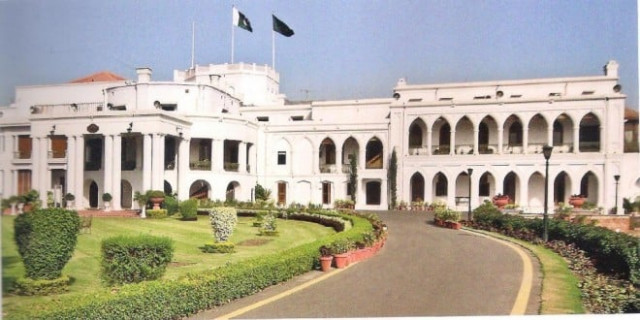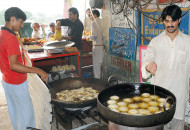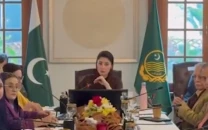Boundary wall of Punjab Governor House demolished
Provincial govt has called meeting today to deliberate on PM’s instructions about removal of wall

PHOTO: FILE.
A senior official of the Directorate General of Archaeology Punjab (DGAP) told The Express Tribune that the directorate had yet to decide the fate of the Punjab Governor's House since the building was protected under the Punjab Special Premises (Preservation) Ordinance, 1985 and the Antiquities Act, 1975. The provincial government had called a meeting on Monday (today) to deliberate on the prime minister's instructions about the removal of the boundary wall of the Punjab Governor's House, he disclosed.
Responding to a question, he said that since it was a protected heritage building so the directorate had to decide whether its boundary wall was also protected under the law or not. He added that in different regimes this boundary wall had been changing like for some period there was an iron grill and later this concrete boundary wall was erected.
An official of the Punjab Governor's House underscored that the entire building was protected under the Punjab Special Premises (Preservation) Ordinance, 1985, the Antiquities Act, 1975 and other international conventions. Initially, the Punjab Construction and Works Department (PCWD) had deployed labour to demolish iron grill of the boundary wall. Labour had started to remove the grill from the Mall Road near Kashmir Road junction. A private consultancy had also been assigned to design new grill which will be erected after removal of the concrete wall, he revealed.
A renowned architect and founding member of the Lahore Bachao Tehreek, Kamal Khan Mumtaz, said that the Punjab Governor's House was protected under heritage laws and no part of the building could be demolished or altered. The law had set procedures that in which circumstances the government could make alterations in such heritage sites and structures.
The Punjab Special Premises (Preservation) Ordinance, 1985, preserves certain premises of historical, cultural and architectural value in Punjab. It controls and regulates alterations therein and demolition and re-erection thereof.
Speaking about the prohibition of destruction of special premises, the ordinance stated: "No alteration or renovation, demolition or re-erection of such portion of special premises as is visible from outside, or any part of such portion, shall be effected without the prior permission in writing of the government or a committee. No authority or local body shall approve any plan in relation to special premises without the prior permission of the government or a committee and any such plan sanctioned before coming into force of this ordinance shall be of no effect unless approved by the government or a committee."
It prohibits destruction of special premises and states: "No person shall, except for carrying out the purpose of this ordinance destroy, break, damage, injury, deface or mutilate or scribble, write or engrave any inscription or sign on such portion of a special building."
The ordinance states: "Whoever contravenes the provisions of this ordinance or the rules shall be liable to imprisonment which may extend to one year or with fine or with both. The Antiquities Act, 1975 also has similar clauses and penalties and some archeologist believe that the buildings and sites protected under the Antiquities Act are more secure than the provincial ordinance. Since this act is a piece of the national legislature so if anyone wants to alter or demolish any part of such site that is protected under this act he has to seek permission from the federal government.
Criticising the provincial government's hasty decision, an archeologist said the government should appeal for donations if it could not afford to maintain a few historic building as it was seeking donations for several other projects. He said that Section 13 of the Punjab Special Premises (Preservation) Ordinance, 1985 empowers the government to receive voluntary contributions and donations for the acquisition, preservation or restoration of special premises and may make suitable arrangements for the management and application of the money.


















COMMENTS
Comments are moderated and generally will be posted if they are on-topic and not abusive.
For more information, please see our Comments FAQ